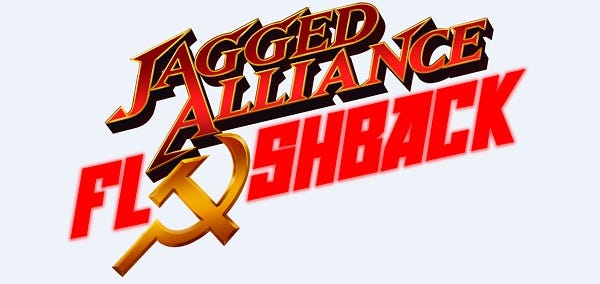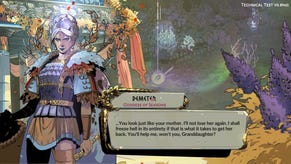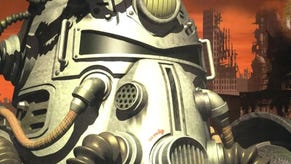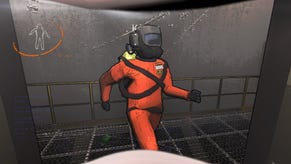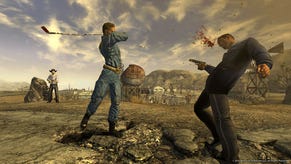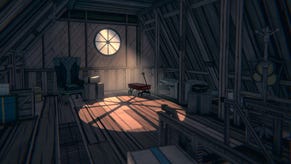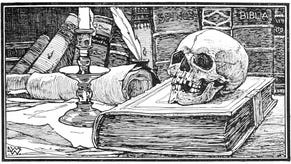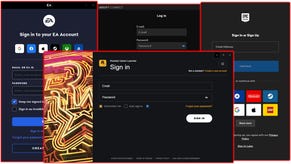Squad Chat: Jagged Alliance - Flashback Interview
A.I.M. For Perfection
I've spent most of my adult life waiting for a worthy successor to Jagged Alliance 2 so when Full Control announced that they had secured the rights to the license, I was eager to find out how true the new game would be to the original two. Heading to Kickstarter next week, where it will have a target of $350,000, Jagged Alliance: Flashback is a prequel that will explore the forming of mercenary organisation A.I.M. and cold war tensions. I spoke to CEO Thomas Hentschel Lund and team-mate Andreas to find out if old mercenary favourites will be back, why Kickstarter and the community matter, and the difficulties involved in resuscitating a franchise.
Note: the first two images are concept shots for Flashback - the rest are taken from Jagged Alliance 2.
RPS: The story about how you secured the Space Hulk license was brilliant. I’m guessing you can’t top it – sharing a urinal next to a mercenary, perhaps?
Lund: I can almost top it! At the same GDC, which is kind of absurd, I was sitting at Game Connect, a business meet-up thing which runs at the same time as GDC – we were pitching for publishers for our previous title Frontline: Tactics. I was talking to some guys from bitComposer, showing them the game, and they were sitting back, totally shell-shocked and then they asked me: “Hey, what would it take to reskin that into Jagged Alliance because we have the license?”
We knew that reskinning a game wouldn’t make a new Jagged Alliance, but we ended up talking back and forth, and they were looking for someone who was willing to make a proper, turn-based single player game. Then we got the Space Hulk opportunity and that became important to close first, but we’ve been talking to the bitcomposer guys on and off since then. We didn’t want to go in and do the classic work for hire kind of thing, which is why we now have this Kickstarter idea. They will give us the license and support us with infrastructure and all the help they can offer without compromising our independence and vision, if we can secure financing and community support through Kickstarter.
RPS: When the Kickstarter craze – and I hate that word – began, I figured Jagged Alliance, or something very much like it without the name, would crop up sooner rather than later. I’d class this as later.
Lund: Yes! We expected it to.
RPS: How big do you think the market for a Jagged Alliance game actually is? Mostly thirty-plus people like me, who remember the good old days?
Lund: I think it’s a really good question. I’ve been surprised again and again by things like XCOM and Wasteland 2, how big a success they have been, either on sale or on Kickstarter. These old IPs have a much broader audience than people expect.
RPS: I do wonder if XCOM and other games have helped to create a new audience, or at least to create excitement.
Lund: The audience has been there the whole time. That’s been our pitch the whole time, although on a smaller scale, that it’s possible to create old-school games for old-school gamers, some of which have families and don’t have as much time anymore. The publishers have disregarded this niche for ages, only going for cover shooters and first-person shooters and racing games. You know the story. XCOM and so many Kickstarter projects have opened up the realisation that the market is there. And it’s much bigger than people expect.
RPS: This new Jagged Alliance won’t be a reboot but a sort of restart, set during the Cold War and telling the story of the founding of A.I.M. What drove that decision?
Andreas: This is the area of prequels – we’ve seen lots of movies looking to tell origin stories. We thought this was a unique opportunity for us to look at the beginning of A.I.M. and to bring back some of the cool mercenaries and tell their early stories, looking at how they became who they are.
Lund: We want to look at why they became mercenaries, where they came from, why they joined this organisation. Why was all this founded? At least for me, if we were just going in and doing yet another dictator on an island story, we would instantly be trying to copy Jagged Alliance 2. Being put on the same shelf, even though that’s not what we really want to do. Being just a copy of what has been isn’t what we want to do. We want to bring something unique and a little different into the mix. And that’s the story part, where we can twiddle around and change things. Because on the other side, the mechanics and the turn-based part obviously, we’re going to see how much of JA2 we can bring back.
RPS: And will that include the complications of the strategic side as well? If you look at the new XCOM, the strategic side is streamlined, but the original X-COM wasn’t as complex on both levels as JA2.
Lund: Yeah, we are going to bring back the strategic side. I think we’re going to run with something in terms of base-building and an open world is something we want to have as well. We’ll have movement in realtime until people hit a combat situation and then it’ll become turn-based again, in a direct copy of JA2’s mechanic. We’re keeping the combat absolutely turn-based but the real-time setting will be open world, with the strategic setting utilising base-building and transportation, those kind of things.
RPS: When you say open world, do you mean you won’t divide it into sectors anymore?
Lund: No, it’s back to the chessboard. But not like a linear progression, from A to Z in terms of levels.
RPS: I know it’s still early days – but have you thought about presentation? Will it be full 3d or do you see the possible advantages of 2d?
Andreas: I think we’re going full 3d. But we’ll keep our own style. In terms of the strategic and tactical, neither layer will be dumbed down. We’re going to improve usability but we’re going to keep it – not hardcore – but up there.
RPS: A little bit hardcore.
Lund: It’s similar to Space Hulk in that the core element of the game is challenge. If we remove that, it’s not JA anymore. There are some of these absolutely core mechanics that games like Back in Action removed, or dumbed down, to the point where it wasn’t JA anymore. At least not to me. They may have opened it up to new players, but they also alienated a lot of the core players.
RPS: The cornerstones of the series, as far I see it, are the mercenaries, their personalities, relationships and the RPG aspects. But also, of course, the complexity behind the scenes.
Andreas: You can’t remove the humour.
Lund: And the dialogues, the environmental interaction. It’s a mix of turn-based action, RPG triangle thing, with a layer of strategic management that really defines the complexity of the game. We really hope that with Kickstarter we can get these things back. Working with the community, we can figure out what triggers the core players want in this game. We have the setting, the technology and the means to make a new Jagged alliance, but there’s definitely a lot of places where we can work with the community toward a common goal. It doesn’t have to replace Jagged Alliance 2 – it will be a cool new, turn-based game.
RPS: I think people often think that a spiritual successor, or reboot, is an attempt to replace something that they love. I love the original X-COM, but I also love the new XCOM. They’re so different that I’m happy they co-exist. Are you looking to create something along those lines? Something new that doesn’t try to take the place of the older game?
Lund: Just doing a JA2 remake is, I think, the wrong way to go now that we have a chance to make something new. We want to bring in some new pieces, while still keeping the essential parts of the franchise there. There were also some significant changes between Jagged Alliance 1 and 2, and some of the expansions. They all kept the core alive and that’s what we have to stick to – to discover what is the core. We have an opinion on that and so do a lot of fans. We have to find this common denominator together, and then we can build story, features and characters. Bring in new characters, bring back the really cool ones from JA 1 and 2, and tell their stories. Why were they mercenaries? They must have been something before – farmers, soldiers…
RPS: Presumably the Cold War setting gives you some interesting angles on some of the mercenaries in the other games. So many of them are clearly culturally and ideologically opposed, at least on paper, at that time.
Andreas: It’s also important to note that everything isn’t set in stone yet. We’re going to build on everything in the original games, but we’re also going to be listening to the fans and the modding community from Jagged Alliance2. We’re going to listen to everything that comes to us.
Lund: At the end of the day, it’s going to be about how successful can we make Kickstarter and how many features can we add, so we’ve tried to come up with stretch goals that will demonstrate that. More mercenaries, destructible environments, that sort of thing. We have to look at what we can do for the amount of money we’re asking for as a minimum – we can make a cool game but we can’t make a replacement for JA2, that has been modded for so many years. It’s impossible. But depending on success, we can add more and more, so hopefully that’s possible.
RPS: Logistically, how would that work, if you reach stretch goals? More time, or a bigger team?
Lund: Both.
RPS: So right now, you have an idea of what you can do with the resources and time you have, but you’d like to expand?
Lund: With the minimum goal and a little beyond, we can take the Space Hulk production team – all the ones who aren’t doing DLC content – and move them into the Jagged Alliance team. The timing has been set up so that we can do preproduction all the way through summer, set up community forums, write the story parts, set up a production plan, and then move the Space Hulk production team across, and then supply resources to that team as far as the budget allows.
RPS: A slightly silly question, but one I thought I should ask…
Lund: Shoot away!
RPS: At any point in the last few days have you had that moment where you think, we have Space Hulk and we have Jagged Alliance…those are two rabid fanbases! Is there fear mixed in with the excitement?
Andreas: (laughs) Oh, you don’t say! I think that the response to the announcement, there was one fan, on your site I think, who said he was happy and wanted to stay optimistic, but was worried that we had these two big games on our hands. Space Hulk is not done yet but we’re on our way! We believe in ourselves and we’re confident.
Lund: The thing that we can do, since we are fans of the games – Space Hulk, Jagged Alliance, X-COM if we ever had the chance. Hey, if you have the Fallout license, I’d love to talk to you! (laughs) These are games that a lot of us grew up with and we feel that they are part of our DNA. They are the reason we’ve been doing turn-based games for the past four or five years exclusively. We’re keeping this alive because we believe that they are games for ourselves. With that confidence we can go in and take these iconic games that we played and we liked, and play something that we want to play.
Hopefully that hits what the fanbase expects. But we’re also realising that, similar to the Space Hulk games, there will be things that have to change. We don’t know what yet. But there are things that we’ll have to pick up and look at it and say, ‘does this work in a modern context’? And then, together with the community, but sometimes making a decision that doesn’t please everybody, but hopefully…
Andreas: A majority? (laughs)
Lund: Or something that we believe so much in that it’s a great game. We’re going to do it.
RPS: I’m always interested when people use the phrase ‘modern context’. People still play Jagged Alliance 2 today, and many people, myself included, would argue that a complex strategy game fits perfectly in a ‘modern context’. What is it that you mean specifically by that phrase?
Lund: Some of it is about accessibility and usability. In earlier days, fifteen years ago, you could get away with any kind of UI. You could get away without using tutorials – that’s actually the wrong word – but players weren’t necessarily eased into the game. Anybody who has played Jagged Alliance 2 knows that you’re thrown in at the deep end right away – it can be overwhelming.
RPS: I didn’t play it for about four years and when I went back, I’d forgotten how much there was to keep track of.
Lund: The modern way, particularly for people who haven’t played these games, or haven’t played them for ten or fifteen years, is to help them to relearn how they work. Not to remove from them, but to show how it works. The 3D part as well, for example, is a modern take on the formula. It’s not always necessary but people like to be able to rotate the camera and see things from a different angle. The usability part – not plastering the screen full of buttons, trying to make it intuitive to use.
Andreas: We’ve also been talking about the cover system. Showing much more clearly where you are when you take cover.
RPS: A lot of it seems to be about communication. Allowing the player to make choices more easily and the game to communicate the meaning and consequences of those choices.
Lund: Also, computers are more powerful. You can put status icons on tiles that show there is cover and which sides the bonus works on and how much. You can calculate all of these things on the fly, which wasn’t necessarily possible in the past. That’s what we mean by modernising.
There's more to come. In the next instalment, we discuss mercenaries, humour and mechanics.
